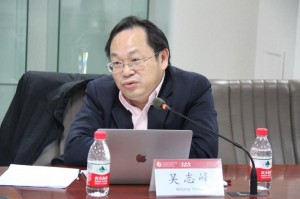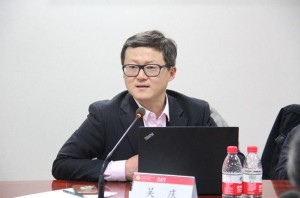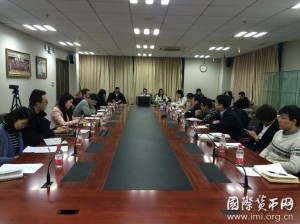Macro-Finance Salon (No. 47): The Influence of Trump’s Team and other Political Forces on His Economic Policy
2016-12-29 IMI Wu Zhifeng’s speech focused on four aspects: first, Trump’s election reflects “a major change in the trend of thought”; second, Trump’s future policy will have “two fundamental points”; third, Trump’s future policy will emphasize on “three priorities”; fourth, Trump’s new team mainly consists of “four groups of people”. He pointed out that Trump’s election reflects the contest between populism and globalization. Globalization increases efficiency of the world, and China, a country moving from a planned economy to a market-oriented economy and engaging in the process of globalization, is the beneficiary. But established developed countries and marginalized countries do not benefit from globalization, especially the blue-collar whites in the U.S. are left behind. Wu also noted that, Trump’s future policy may have two fundamental points, one is the deep-rooted tradition of “state autonomy”, the other is the religious thought of Puritan and Calvinism. He said that Trump may have three policy priorities: First, he will boost US domestic economy, which won’t just be a slogan but a commitment that will sure to become true, and he will also revitalize US manufacturing industry. Second, he will cut taxation substantially for attracting more global manufacturing companies. Third, as for international trade, Trump may halt TTP, which will put pressure on China. He believed that Trump’s new team mainly consists of four groups of people: the white, the rich, army men and madmen, and these people will affect Trump's future economic policies.
Wu Zhifeng’s speech focused on four aspects: first, Trump’s election reflects “a major change in the trend of thought”; second, Trump’s future policy will have “two fundamental points”; third, Trump’s future policy will emphasize on “three priorities”; fourth, Trump’s new team mainly consists of “four groups of people”. He pointed out that Trump’s election reflects the contest between populism and globalization. Globalization increases efficiency of the world, and China, a country moving from a planned economy to a market-oriented economy and engaging in the process of globalization, is the beneficiary. But established developed countries and marginalized countries do not benefit from globalization, especially the blue-collar whites in the U.S. are left behind. Wu also noted that, Trump’s future policy may have two fundamental points, one is the deep-rooted tradition of “state autonomy”, the other is the religious thought of Puritan and Calvinism. He said that Trump may have three policy priorities: First, he will boost US domestic economy, which won’t just be a slogan but a commitment that will sure to become true, and he will also revitalize US manufacturing industry. Second, he will cut taxation substantially for attracting more global manufacturing companies. Third, as for international trade, Trump may halt TTP, which will put pressure on China. He believed that Trump’s new team mainly consists of four groups of people: the white, the rich, army men and madmen, and these people will affect Trump's future economic policies.
 Wu Qing believed that Sino-US relationship should “focus on facts but not specific individuals”, that the US should be rendered as a friend, not an enemy. He emphasized that the execution of Trump team is strong. Because it is a team of soldiers and multinational company executives who are capable of pushing ahead, Trump policy may be implemented ahead of schedule. He stressed that for Trump and his team, Sino-US relationship is not only important but even a policy focus. Trump had said that Americans wanted their jobs back, and China would be the first to be affected. This transfer will have asymmetric effects on China and the United States, meaning China will be more affected. Wu said that China still considers Sino-US relationship as one of the most important diplomatic relationships, and only a healthy Sino-US relationship can help China participate in the future of the civilized world and engage in a new round of globalization.
Wu Qing believed that Sino-US relationship should “focus on facts but not specific individuals”, that the US should be rendered as a friend, not an enemy. He emphasized that the execution of Trump team is strong. Because it is a team of soldiers and multinational company executives who are capable of pushing ahead, Trump policy may be implemented ahead of schedule. He stressed that for Trump and his team, Sino-US relationship is not only important but even a policy focus. Trump had said that Americans wanted their jobs back, and China would be the first to be affected. This transfer will have asymmetric effects on China and the United States, meaning China will be more affected. Wu said that China still considers Sino-US relationship as one of the most important diplomatic relationships, and only a healthy Sino-US relationship can help China participate in the future of the civilized world and engage in a new round of globalization.
 During the roundtable discussion, Tu Yonghong said that Trump’s policy resembled Reagan’s policy; Chen Qiqing said that analysis of Trump’s team staff should first identify who could really influence Trump; Xu Zhaoying analyzed this issue from the perspective of Sino-US international relationship.
During the roundtable discussion, Tu Yonghong said that Trump’s policy resembled Reagan’s policy; Chen Qiqing said that analysis of Trump’s team staff should first identify who could really influence Trump; Xu Zhaoying analyzed this issue from the perspective of Sino-US international relationship.

